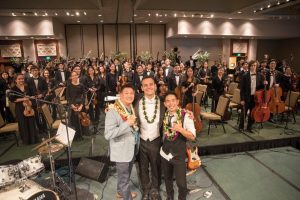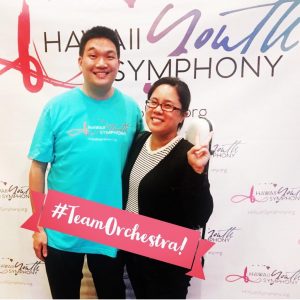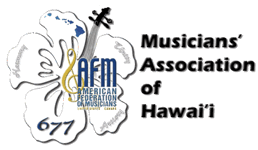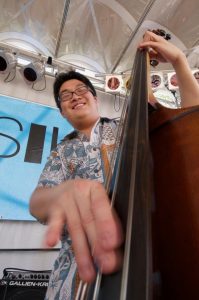MEMBER SPOTLIGHT: Hawaii Youth Symphony President Randy Wong
Award-winning community leader works hard, so children can play

With maestro Joe Stepec, ukulele phenom Jake Shimabukuro, and the Hawaii Youth Symphony — ready for a live performance.
“I am very grateful to HYS for being a constant, positive force in my life, and am honored to now serve as its president. Our vision to make music a right, and not a privilege, deeply resonates with me—all children should have an opportunity to learn a musical instrument, and to become the best version of themselves.”
Talk to Randy Wong, even for 15 minutes, and you immediately understand why he’s head of the Hawaii Youth Symphony, from executive director in 2012 to president six years later, and why he’s led the charge for music outreach in our youth communities, especially those most under-served.
His commitment, passion, and faith in music’s profound ability to change lives…shine through. His life-long mission — as a former HYS student musician, Hawaii Symphony Orchestra bassist, 20-year union member, and award-winning community leader — is clear: work hard, so children can play. All children, everywhere. Because “music [is] a right, and not a privilege.”
“Having an opportunity to play music is something that every child deserves, and it’s up to us adults to protect and promote pathways to make it possible for them to do so.”
Through various programs and partnerships, Wong has gone about ensuring this happens.
Ke Ola O Na Mele caught up with the busy working musician and respected community leader recently. His interview follows.
What are musicians doing to sustain a living wage with everything going virtual?
Musicians have long been entrepreneurs, and with everything going virtual, this spirit has become more necessary than ever. It’s been an interesting time to practice, reflect, and be creative. Teaching was already an important part of many careers, and for those who feel comfortable teaching remotely, this has become an important lifeline.
How long have you been a member of Local 677? What does the union mean to you, and why should more up-and-coming musicians use Local 677’s resources in this day and age of catch-as-catch-can?
I’ve been a member for about 20 years. As a young musician, I heard a lot about “the union” from my teachers and mentors, and joining felt like a coming-of-age moment. Being a member of a union means that I will always know people who appreciate the craft as much as I do. With all the change happening due to technological advancement, Local 677 helps working musicians to stay current and make sure we are properly compensated, while corporate profits rise. Standing together will always have more meaning than standing alone.
In your Hawaii Youth Symphony bio online, you shared that “…Our vision to make music a right, and not a privilege, deeply resonates with me…” Why is this so important to you, as a professional working musician and HYS President?
When I returned to Hawaii in 2011, I was wondering how many of our schools have music programs. I was surprised to learn that the State DOE does not track that information, and that there was no coordinated effort at the state level to ensure that every child would have music education. There are nearly 200,000 children in our state annually, and the vast majority of them do not have access to music education — they don’t learn to sing, read music, play an instrument, or develop any kind of knowledge of music. We need to right that.
Artistic studies build children’s work ethics, their intellectual/higher-order thinking skills, and their personal and interpersonal intelligences. Art inspires us to be curious and creative, to take risks, and to be flexible and adaptive. These are qualities that we need in the workforce, as well as the community at large.
These days, HYS programs include jazz, ukulele, and other styles of music, in addition to orchestra, string quartet, and wind chamber music. It’s my hope that, with so many opportunities for students, those who are interested will come out and play!
HYS also means a great deal to you personally. It’s been a “constant, positive force” in your life growing up as one of those young student musicians. How has HYS helped you? Why are such organizations and programs essential to youth all over the world?
HYS opened up a whole new world for me as a child: I met dozens of kids from schools all across the state and it was gripping to making music with so many others that also loved orchestra! As I progressed, HYS helped me seek more opportunities and make more friends. School music programs and youth orchestras do a terrific job of bringing out the best in young people, and they go onto become audience members and advocates for live music as adults.
What does music do for kids? Studies show that even a rudimentary knowledge of music — learning to read notes — gives you a better grasp of Math.
Yes, there are a lot of studies that show correlations between musical learning, language literacy, mathematical skill, etc. Reading music notation is like reading a graph; the X-axis is time and the Y-axis is pitch. It’s also like reading an equation — each note is symbolic notation, or poetry — dynamics and phrase markings are analogies. However, first and foremost, I believe music helps kids develop a sense of curiosity, of purpose, of self, and respect for others. From the curiosity grows their interest and passion to become musicians, and to become the best they can be, individually and collectively.
What first got you interested in music, not just as an interest, but a serious career?
My father Mike Wong plays ki ho‘alu slack-key guitar and ukulele. He had a lot of friends that always needed a bassist, and they would invite me to sit in on their gigs. Later on, I learned about the lives of working musicians from my teachers and it just seemed so cool!
How have you been able to overcome some of the more pressing challenges of a working musician, such as making a living, keeping up the music during the down times, COVID-19’s detrimental shut-down of live venues?
Practicing has always been there for me. The lock-down gave me some time to reflect, transcribe, digest others’ music, and work on a few projects I’ve put off too long, but I can’t wait to get back on stage.
You also have your own exotica band, Waitiki, performing a kind of throwback tribute to the lounge jazz (props, Harold Chang!) so prevalent in Waikiki during and after WWII. Exotica…that’s really specific.
The music’s kind of an early World Music hybrid, a blend of cultures and influences that existed in post-war Hawaii. Though it had many influences and contributors, exotica’s live, chamber sound was really borne by Honolulu’s working musicians — Martin Denny, Arthur Lyman, Harold Chang, Augie Colon, John Kramer, Gene Rains, Alfred Apaka, Ethel Azama, Paul Conrad, and many others. Hollywood composers Les Baxter, Robert Drasnin, and Juan Garcia Esquivel were among those who were instrumental in getting the sound to a larger audience.
Modern iterations of exotica tend to pair the music with other subcultures, like burlesque, hot rod, and surf, but in Waitiki, we focus on just the music. The other musicians are Tim Mayer (soprano sax/alto flute), Helen Liu (violin), Jim Benoit (vibraphone), Zaccai Curtis (piano), Abe Lagrimas Jr. (drums), Lopaka Colon (percussion), and myself on bass.
What have been some of your favorite memories as a musician? You’ve performed alongside and with some big names in the industry.
Playing with Kenny Loggins for HSO Pops was fun. So was playing with George Clinton at one of President Obama’s inaugural balls. George Clinton’s rhythm section went to the wrong Marriott, and with all the road blocks, they couldn’t make it to the Ball. I had just finished playing with Brother Ah (Robert Northern), and so we all got to do it, instead!
In October 2019, I went to Mexico City to celebrate the 100th anniversary of the Space Age Bachelor Pad composer Juan Garcia Esquivel and perform his music with the Orquesta Nacional de Jazz de México (ONJMX). Esquivel was better known in the U.S. as a studio arranger for RCA. His music was rarely performed live, and never in Mexico, though many Mexican children grew up watching the kids’ TV show “Burbujas,” whose theme song Esquivel composed. When Waitiki performed Esquivel’s music in Mexico back in 2005, it was the first time it had been heard live in his home country in decades. Over the last 15 years, and thanks to ONJMX, Esquivel’s music has experienced a renaissance, and I was invited to return and perform with them.
Who are some of your musical heroes and how have they influenced your playing?
I’ve always admired the style of cellist Pierre Fournier or violinist Joseph Szigeti. Christian McBride and Dave Holland are both heroes; I love and respect their versatility as bassists, leaders, and arrangers. And, people who are passionate ambassadors for music’s ability to connect cultures, ideas, and people. Yo-Yo Ma, Oumou Sangaré, Bobby McFerrin, Chick Corea, and of course, Jake Shimabukuro!
You’ve also had your music appear on TV and in film. Any stand-outs you’d care to mention?
The Department of Defense featured my music and interviewed me for their TV series, “America: Who We Are.” It airs on their Armed Forces Network worldwide! A German filmmaker tapped Waitiki for the soundtrack to his project, “The DVD of Tiki,” an epic three-hour feature film on exotica and mid-century pop culture.
Your resume is stacked: Harvard, New England Conservatory… Hawaii Community Foundation’s 2018 Ho’okele Award winner for nonprofit leadership… Hawaii Symphony Orchestra bassist… co-founder of your own label, Pass Out Records… published research on music’s role in education in communities… alumnus outreach (Emerging Leaders Program — League of American Orchestras, Executive Program for Nonprofit Leaders — Stanford Graduate School of Business, AmEx Leadership Academy — Center for Creative Leadership)…
What’s it like to be recognized, and to not only be involved in the community like this, but fully engaged and plugged in?
It’s incredibly humbling, and energizing, to be in conversation with people who are passionate about music, the arts, and nonprofits. I’m constantly in a learning mode, seeking new inputs and finding ways to understand what issues are most salient to those around me. Together, I believe we can create opportunities and experiences for greater community benefit.
How did you get where you are today? What does it take for one person to say, “You know what? I’m not going to just coast through life, blowing in the wind. I’m going to take charge and do something to help people?”
Many of my family members, and especially my parents, have been dedicated to community service and community improvement. I’m very fortunate that the Hawaii Youth Symphony’s board selected my resume from the pile and offered me a chance to serve! Since then, I’ve just been trying to do the best I can. Having an opportunity to play music is something that every child deserves, and it’s up to us adults to protect and promote pathways to make it possible for them to do so.

The double-bassist loves spending his spare time tossing the Frisbee around with his wife Helen Liu.
How would you describe your style? What’s your favorite music to play?
I try to fit in and be as supportive as possible, no matter what kind of ensemble I’m in. The best compliment is not when someone says, “You sounded great!,” but, “Wow, everyone sounded good together.” Actually, that’s also how I view my leadership and administration style. I aim to create respectful, responsible spaces where the team can feel comfortable doing their best work, where everyone knows their role, and everyone feels that they have support to do what they need to be their best.
What do you love most about playing music?
The sense of community, the ability to create and communicate non-verbally, the opportunity to be part of something larger than myself.
With all you’ve got going on, what do you do to kick back and relax?
Grab a cup of coffee and listen to music at the beach. Or play Frisbee with my wife!
If you could choose another career path, a different one, which would you choose?
I’d stay in the arts, but maybe a switch to dance? I know very little about it, and have never studied it, but have always been curious.
COVID-19’s stopped life in its tracks, world-wide. Once restrictions ease and the vaccines go to more and more of the population, what would you love to do next, musically, professionally?
Hoping to do more performing and recording with Waitiki, particularly alongside chamber ensembles and pops orchestras.
From the Spring 2021 issue, Ke Ola O Na Mele
Waitiki plays Martin Denny’s “Manila” at Hawaii Public Radio.

